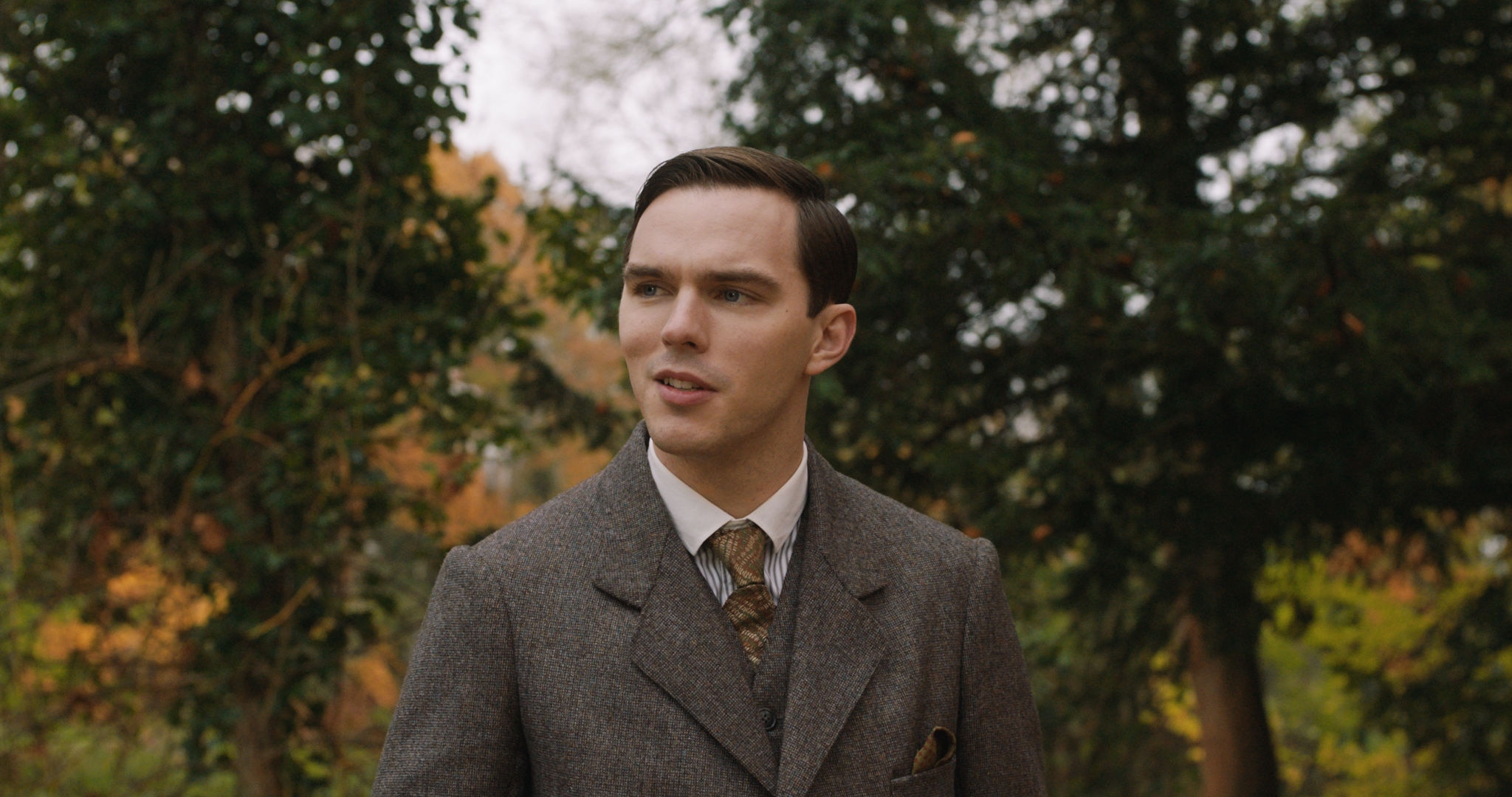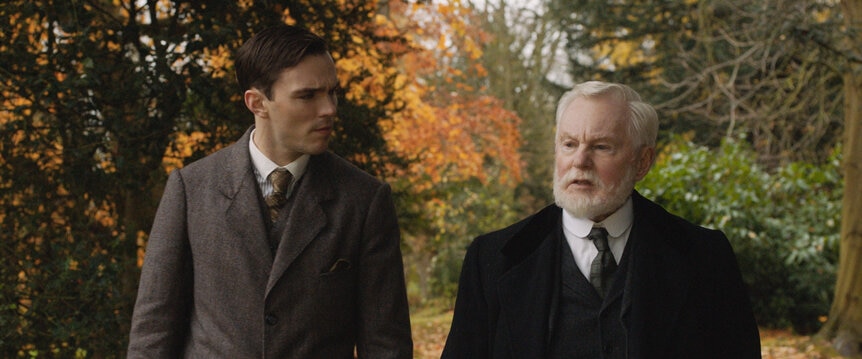Create a free profile to get unlimited access to exclusive videos, sweepstakes, and more!
How Tolkien gets the joy of philology right

Writing is boring to look at. There, I said it. Of all of the art forms to depict in the visual medium of film, writing is just the worst. There’s simply nothing cinematic about a writer slowly ruining their eyesight and posture at their desk, be it Jane Austen working on a manuscript or yours truly hunkered down over her “battle station” (it involves a GameBoy Color).
This is one of the central challenges any writerly biopic faces.
Now add in the challenge of making a biopic about one of the greatest fantasy authors of all time while also not having the approval of the Tolkien Estate itself or the rights to depict the bulk of Tolkien’s legendarium onscreen. It is, to put it mildly, an unenviable task, but it is the one that Tolkien, the recent biopic, takes on. For all of its deliciously lush shots of early 20th-century Oxford, you must admit it’s hard to tell the love story between Tolkien and his wife when you can’t even show their gravesites, where their graves read “Beren” and “Luthien.”
But Tolkien’s challenges don’t stem from a lack of understanding who Tolkien was. I believe every text — in the all-encompassing academic use of that word — has value if it engenders even a shiver of response or emotion. It’s this belief that makes us so often recommend specific scenes from films or songs from musicals because the creators did manage to successfully communicate what they were trying to capture in those moments.
For Tolkien, that scene is Professor Wright’s monologue on the philology of the word "oak."
Philology is a specific branch of language studies that focuses on the historical and cultural development of a language or languages. I could tell you that there are certain nautical words in English that come from Dutch, but a student of philology could tell you these Dutch words got into the English lexicon because everybody on the North Sea coast in the 5th century spoke a West Germanic language like English or Dutch and working on a ship together required some form of communication.Philology, as Edith actually points out in an earlier scene without saying the word, is the study of what makes language alive. It was one of Tolkien’s greatest passions, both as a working academic and as a writer. Middle-Earth, after all, began as Tolkien constructing the Elven languages and creating the culture and history necessary to breathe life into it. It’s this passion and meticulous craft many fans of Tolkien respond to, myself included. Tolkien once described reading a book on Finnish grammar “like discovering a complete wine-cellar filled with bottles of an amazing wine of a kind and flavour never tasted before” in a letter to W. H. Auden. Tolkien’s philology in his fantasy works nurtured my own love for language and etymology.
But capturing that particular joy on film is an even taller order than making writing look interesting. And yet Tolkien, like the man himself, rises to the challenge.
Professor Joseph Wright, one of Tolkien’s main academic mentors at Oxford, is imagined as a Gandalfian figure in the film, played by Derek Jacobi. The young Tolkien meets him by chance at a fencing match and is baffled when Wright flees from him. After chasing him across campus (a scene that earned the biggest laughs at my screening), Tolkien finds him walking in the woods.
Instead of answering the basic question of “hey, why did you bail on me the moment I said my name?”, Professor Wright instead launches on a soliloquy on the word “tree.”A word achieves meaning by our experiences with what it is meant to name. One of Tolkien’s strengths as a film is its Tolkienesque love of the English countryside, and the camera is never so enraptured with it as it is here: looking up from a low angle, gently swaying and circling the way Edith dances under them when she and Tolkien are alone. There’s a dreamy, ageless luminescence to these shots—like something out of Tolkien’s legendarium.
As the camera lingers lovingly, Wright tells us of a boy that learns the word for tree, learns to associate with the actual thing itself. He plays in the tree, learns its roots and branches. When he becomes a man, Wright tells Tolkien, “he gets married under it … and rides past it on his way to war.” At every stage of his life’s journey, the tree roots itself into his life until, of course, “he is buried under it.”
Now, and only now, Professor Wright tells us, can we understand that all of these experiences buttress our understanding of a single word: oak. Without a story, without a life, a word has no meaning.
It’s as if Wright casts a spell with that word. Having living legend Jacobi creak it out as if creating the very concept from the ether doesn't hurt either. The nuances and graces of language are difficult to capture in a visual medium, and yet this otherwise generally okay film somehow manages to do so. And if there was anything to get right in a movie about J. R. R. Tolkien, it would have been communicating why he loved one of his greatest passions.
Wright doesn’t play much of a role in the rest of the film, which runs through the rest of Tolkien’s life before The Hobbit at a pretty steady clip — but his influence beautifully lingers, just like a good piece of Finnish grammar.
The views and opinions expressed in this article are the author's, and do not necessarily reflect those of SYFY WIRE, SYFY, or NBC Universal.




























